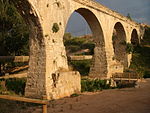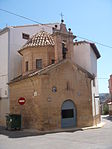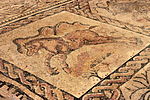Calanda | |
|---|---|
 | |
| Coordinates: 40°56′27″N0°13′54″W / 40.94083°N 0.23167°W | |
| Country | |
| Autonomous community | |
| Province | Teruel |
| Comarca | Bajo Aragón |
| Government | |
| • Mayor | José Ramón Ibáñez Blasco (PSOE de Aragón) (2015–2019) |
| Area | |
• Total | 112.25 km2 (43.34 sq mi) |
| Population (2018) [1] | |
• Total | 3,708 |
| • Density | 33/km2 (86/sq mi) |
| Demonym | Calandino |
| Time zone | UTC+1 (CET) |
| • Summer (DST) | UTC+2 (CEST) |
Calanda is a town in the province of Teruel, Aragon, Spain. It lies on the southern fringe of the Ebro river basin, at the confluence of the Rivers Guadalope and Guadalopillo.
Contents
- Historic structures
- Demographics
- Geography
- Climate
- Notable natives and residents
- See also
- Sister cities
- Bibliography
- Filmography
- Gallery
- Archaeology: Camino de la Vega de Albalate
- See also 2
- References
- External links
The local economy is based upon agriculture, especially the cultivation of peaches and olives, both of which have Protected Designation of Origin status: Melocotón de Calanda in the case of the peach production and Aceite del Bajo Aragón for the olive oil. Other agricultural products are almonds and other fruits as well as some cereals.




















